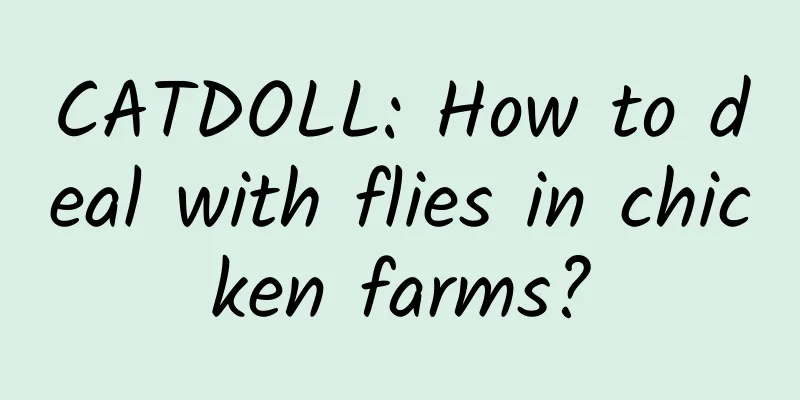CATDOLL : CATDOLL: How to deal with flies in chicken farms?

How to deal with flies in chicken farms?The problem of mosquitoes and flies in the chicken house is a common problem, which has a certain seasonality. Flies come here to smell the food, not to mention the feces. As long as there is an environment suitable for fly egg laying, flies will come here. There are more flies in the summer, and although there are also flies in the winter, they are relatively less. However, when there are more flies, it will have a great impact on the overall growth of chickens. Mosquito and fly damage: Flies can spread various diseases, such as E. coli, Pasteurella, etc. Especially after chickens become sick, flies will accelerate the development of the disease. Even when the chickens are healthy, dense swarms of flies constantly biting the chickens' eyes and other places will make them irritated and affect their feed intake. If there are mosquitoes, the most direct manifestation is the harm of fowl pox, which will affect the appearance and sales price of chickens. Common fly control solutions in the market: There are two main types of fly killers that are relatively cheap and popular among farmers on the market: Cyromazine: Adding cyromazine to feed directly blocks the development of fly larvae and fundamentally reduces fly breeding. However, cyromazine is quite harmful to humans and may cause fetal malformations. It is now banned in the market, and even if it is used, it is only used by a small number of people. It is recommended not to deliberately add this type of drug. Killer: This type of drug is more popular among farmers in the market. You can see the effect of killing flies, and dense flies die. However, this type of drug has a fatal disadvantage: the more you use it, the more flies you will get. I encountered a similar situation in a farmer's chicken coop. In the spring, there were not many flies. However, there were particularly many flies in the chicken coop of one farmer. When I asked the reason, it turned out that they used a fly-killing drug that could attract and kill flies. This type of drug will attract flies from the surrounding areas into the chicken coop, resulting in more and more flies being killed, and if not killed, the flies will become excessive, forming a vicious cycle. For both methods, it is not recommended for farmers to use. It is normal to have flies in the chicken house. If the number is not large, you don’t need to use medication. If you need to control it, you can control it from two aspects: management and rational use of medication: 1. The chicken house is sealed. Many chicken coops nowadays are relatively simple, so this is difficult to achieve, but it is necessary to consider adding screens at vents and other locations to reduce the number of flies that directly enter the chicken coop. 2. Clean the chicken coop. The feces in the chicken house needs to be cleaned regularly to reduce the breeding of fly larvae. 3. Drug control. Spraying drugs such as cypermethrin on the walls, aisles and other places in the chicken coop, where chickens do not move, can inhibit the survival of flies to a certain extent. |
<<: CATDOLL: How to quickly find ant nests at home?
>>: CATDOLL: The easiest way to raise earthworms
Recommend
CATDOLL: Is raising ants profitable? How much is it now? (Is raising ants profitable? How much is it now per month?)
1. How is the market for ant breeding? Ant farmin...
CATDOLL: Does the black carp have more bones or the black carp has more bones?
1. Does snail, black carp or black carp have more...
Are cats suitable for the bedroom?
Cats are not suitable for bedrooms. If the space ...
CATDOLL: What does the seasonal issue of silkworm rearing mean?
1. Which month is it best to raise silkworms? 1. ...
CATDOLL: Memories of summer vacation
1. Memories of summer vacation Summer vacation ha...
CATDOLL: What are the translucent jelly-like substance and white spiral-like substance in the head of silver carp?
1. What are the translucent jelly-like substance ...
CATDOLL: What are the conditions for breeding fireflies? (What do the conditions for breeding fireflies mean?)
1. What are the conditions for artificially breed...
CATDOLL: The fastest and safest way to introduce a queen to Chinese bees, and how long does it take to release a queen
1. Honey water method: spray the queen bee and th...
CATDOLL: What flies eat and drink will kill them quickly (What flies eat and drink will kill them quickly)
1. What is the most effective way to eliminate fl...
CATDOLL: How to breed musk turtles?
How to breed musk turtles? Musk turtles are a ver...
CATDOLL: How to breed hairy crabs?
How to breed hairy crabs? The hairy crab is a hig...
CATDOLL: Red and swollen eyes in pigs: causes, symptoms and treatments
Causes of red and swollen pig eyes Red and swolle...
What is the personality of an Exotic Shorthair cat?
Exotic Shorthair cats are quiet, docile, cute, sw...
The key to improving farm efficiency: how to price pigs appropriately
In the livestock industry, the reasonable pricing...
CATDOLL: What is the market prospect of farmed snails?
What is the market prospect of farmed snails? I t...









